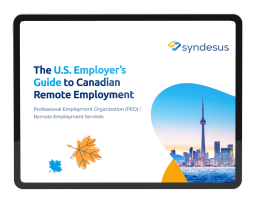US employers that hire international workers are increasingly considering Canada, especially when facing the unpredictable H-1B visa process. While Canada seems like the next logical step, what happens when an employee actually gets selected for the H-1B visa, whether it’s a subsequent year’s H-1B lottery or the second or third lottery drawing in a given year?
Companies, understandably, often decide to move forward with the H-1B visa, as that allows them to keep the individual working within the US. But what happens next? Obtaining an H-1B is the start of a longer immigration journey, especially for Indian and Chinese nationals, which means it’s a great idea to keep remote work in Canada open as another option.
Here’s why.
Getting a H-1B visa is the beginning of a long US immigration journey
Receiving an H-1B visa is undeniably a significant achievement for both employees and employers. However, it is often just the starting point of an even longer immigration journey. The H-1B is labeled a “non-immigrant” visa and has a general limit of 6 years. Many immigrants mean to obtain a Green Card (US Permanent Residency) as a next step, in order to build towards a stable life and future in the US.
However, in reality, rather than signifying the end of anxieties tied to visa lotteries and applications, the H-1B is often the beginning of a prolonged waiting period before being able to apply for permanent residency. This wait can be exacerbated by other factors, including what country the employee is originally from.
H-1B workers can wait decades for US permanent residency
The transition from H-1B to Green Card status is not always smooth. There’s no guarantee that a company will sponsor the employee for a Green Card when the time comes, and even if they do, and the individual files for permanent residency, the wait can take years.
Indian nationals, in particular, have to wait for decades, while still working and trying to buil a life in the US, before obtaining permanent residency. While 140,000 employment-based Green Cards are made available each year, current US immigration policy caps each country at 7%, and because there are so many Indian nationals applying for employment-based Green Cards, a staggering line has formed.
This precarious status, which also affects individuals from China, Mexico, and The Philippines, makes it challenging to make long-term life decisions like purchasing a home or starting a family. For this reason, many high-skilled tech immigrants in the US have been looking to Canada which offers a better option with its effective and smart immigration system.
Many individuals are able to keep their US tech job while living in Canada, enjoying both a high salary and a clear route to citizenship. It’s even possible to move back to the US down the line, this time approaching the process as a Canadian citizen.
Canada offers a smoother pathway to permanent residency and citizenship than the US.
Canada stands out in the race to attract global tech talent. They recently unveiled a new work permit targeting immigrants in the US holding H-1B work visas which swiftly reached its 10,000-applicant cap. Coupled with programs like the Global Skills Strategy — a fast-track immigration program for skilled workers — Canada is not only welcoming tech workers rapidly but also offering a swift path to permanent residency.
The timeline is so efficient that, in many cases, by the time an H-1B holder in the US even applies for their employment-based Green Card, often 4-5 years into their H-1B journey, they could have already secured Canadian citizenship and all the benefits that entails — typically, within that same five year period!
So, while the H-1B visa is a considerable accomplishment, it’s important to keep future options open. Canada, with its friendly immigration policies and the promise of a stable future, should always be on the radar for companies and professionals.
Syndesus helps US-based companies with tech workers hire those tech workers remotely in Canada.
Syndesus provides PEO and EOR solutions that help US companies with and without an office in Canada leverage Canada’s tech talent and favorable immigration laws for tech workers, whether those companies are small US startups or large corporations.
Hiring workers remotely in Canada through Syndesus means that the immigration, payroll, HR, tax, and other administrative processes are taken care of for you while you focus on expanding or retaining your talented workforce.
Reach out to us to learn more about how we can help you hire and retain talent remotely in Canada!

About Marc Pavlopoulos
Marc Pavlopoulos is the CEO and Founder of Syndesus, a Professional Employer Organization that provides PEO services for US companies seeking to employ workers remotely in Canada, builds engineering teams in Canada for VC-backed startups in the US, and set-up remote offices in Canada for US companies. Additionally, Syndesus can assist foreign-born tech workers (and their US employers) with options for working remotely in Canada if they cannot stay in the US due to immigration/work visa issues.
As an American who has moved to Canada twice (for grad school and for work), Marc understands the challenges involved in starting a new life in a new country. Marc is a son of an immigrant and has great respect for people who leave their home country and seek a better life in the US or Canada.
Marc’s goal is to do everything he can to help those individuals achieve their dreams. Marc also has a second venture (Path to Canada) which helps foreign-born technical workers who cannot stay in the US (for immigration reasons) get a job and work authorization to work in Canada.






